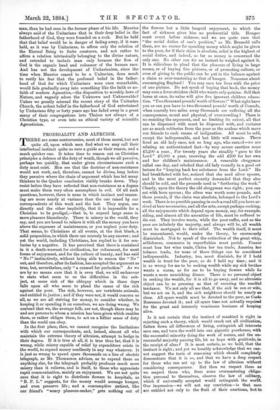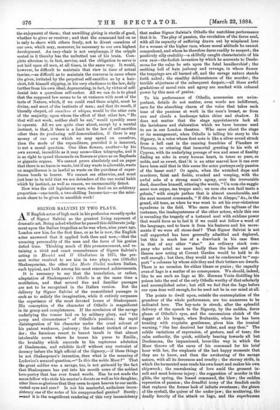PRODIGALITY AND ALTRUISM.
MHERE are Home controversies, most of them moral, but not quite all, upon which men find what we may call their intellectual instinct quite as sure a guide as their reason, and a much quicker one. It takes time to reason out on Christian principles a defence of the duty of wrath, though we all perceive, perhaps too quickly, that under given circumstances such a duty must exist. Men see that the doctrine of non-resistance would not work, and, therefore, cannot be divine, long before they perceive where the chain of argument which has led many thinkers to the Quaker conclusion visibly breaks down. They resist before they have reflected that non-resistance as a dogma must make them very often accomplices in evil. Of all such questions, however, there is none in which instinct and reason- ing are more nearly at variance than the one raised by our correspondents of this week and the last. They argue, one directly and the other implicitly, that it is impossible for a Christian to be prodigal,—that is, to expend large sums in mere pleasure blamelessly. There is misery in the world, they say, and you are bound to relieve it with all the money you have above the expenses of maintenance, or you neglect your duty. That seems, to Christians at all events, at the first blush, a solid proposition, to which there can scarcely be any answer ; and yet the world, including Christians, has replied to it for cen- turies by a negative. It has perceived that there is contained in it a death-warrant for civilisation, for refinement, for most forms of enjoyment, and for the culture of beauty, and has said "No !" instinctively, without being able to reason the " No " out, and therefore, after its fashion, has accepted the argument as true, but, nevertheless, only "a counsel for perfection." As we are by no means sure that it is even that, we will endeavour to state what seem to us the difficulties in the sub- ject, at some risk of the obloquy which in these days falls upon all who seem to plead the cause of the rich against the poor. The rich, however, are vertebrate animals, and entitled to justice ; and if they were not, it would concern us all, as we are all striving for money, to consider whether, in keeping it or spending it on ourselves, we are doing wrong. We contend that we, the average folk, are not, though there may be and are persons to whom a mission has been given which enables them, or rather obliges them, to act on a lbftier sense of duty than the world can obey.
In the first place, then, we cannot recognise the limitations with which our correspondents, and, indeed, almost all who maintain the extreme theory of altruism, attempt to hedge in their dogma. If it is true at all, it is true thus far, that it is wrong, while misery capable of relief by expenditure exists in the world, to expend money needlessly in any way whatever. It is just as wrong to spend spare thousands on a line of electric telegraph, as Mr. Thomasson advises, as to expend them on anything else, for the telegraph probably produces much more misery than it relieves, and is itself, to those who appreciate rapid communication, mainly an enjoyment. We are not quite sure that it is right to distribute flowers to hospitals, as "B. P. L." suggests, for the money would assuage hunger, and even preserve life ; and a consumptive patient, like our friend's "weary pleasure-seeker," gets nothing out of
the flowers but a little languid enjoyment, to which the fact of sickness gives him no preferential title. Hunger must count before sickness, and we are quite sure that "the social duties of one's position," as Mr. Brameld calls them, are no excuse for spending money which might be given to the poor, for if their claim is absolute, relief is the highest of social duties, and indeed, as far as money is concerned the only one.. No other can for an instant be weighed against it. It is ridiculous to plead that the pleasure of living in large rooms, or of baying fine pictures, or of promoting culture, or even of giving to the public can be put in the balance against a claim so over-mastering as that of hunger. Nonsense about encouraging Raphael ! You may save ten lives with the price of one picture. Do not speak of buying that book, the money may care a fever-stricken child who wants only quinine. Sell that horse at once, its value will give five ignorant children educa- tion. "Two thousand pounds' worth of flowers!" What right have you or can you have to two thousand pounds' worth of Consols, when scarcely two miles away thousands are suffering all the consequences, moral and physical, of overcrowding ? There is no resisting the argument, and no limiting its extent, all that can be dispensed with must be dispensed with, and curtains are as mach robberies from the poor as the azaleas which move our friends to such reams of indignation. All must be sold, except the indispensable, and but little will remain. There lived an old lady once, not so long ago, who earned—we are relating an authenticated fact—by very severe exertion some 23,200 a year.. For twenty years she steadily "gave to the Lord" 23,000 a year, reserving the odd 2200 for her own and her children's maintenance. A venerable clergyman called one day, and rebuked that old lady roundly in a good set lecture for "keeping back her substance from the Lord." He had breakfasted with her, noticed that she used silver spoons, and in the most perfect sincerity demanded that they also should be sold, and the proceeds used in "furthering the work." Clearly, upon the theory the old clergyman was right ; you can eat with horn spoons ; the silver was worth some pounds, and those pounds, if the claim was absolute, belonged to the Lord's work. There is no possible pausing in such a road till you have ar- rived at bare necessaries, and all the arts, except perhaps cooking, all the enjoyments which depend upon money, say, for example, riding, and almost all the amenities of life, mast be suffered to die out. They involve waste, while the poor suffer, and as the poor are infinitely the majority, and always will be, all wealth must be mortgaged to their relief. The wealth itself, it must be remembered, would, under the theory, be enormously diminished. Not to speak of the extinction of the great whip, selfishness, commerce in superfluities must perish. France must lose her wine uncle, China her tea trade, America her tobacco trade, for none of those things can be considered indispensable. Industry, too, must diminish, for if I hold wealth in trust for the poor, so do I hold my time ; and it is as wrong for me to be seeking wealth while my sick brother wants a nurse, as for me to be buying flowers while he wants a more nourishing dinner. There is no personal object in seeking the wealth, for it is all to go away, and no altruistic object can be so pressing as that of ensuring the needful tendance. We not only all see that, if the sick be son or wife, but we act on it, and the sick neighbour should be nearly as close. All spare wealth must be devoted to the poor, as Carlo Borromeo devoted it; and all spare time not actually required for the great and intensely wearisome business of keeping alive.
Is it not certain that the instinct of mankind is right in rejecting such a theory, which would crush out all civilisation, flatten down all differences of living, extinguish all interests save one, and turn the world into one gigantic poorhouse, with the successful minority doing the work of nurses, and the un- successful majority passing life, let us hope with gratitude, in the receipt of alms ? It is most certain, as we hold, that the instinct is right ; and yet we humbly acknowledge that we can- not suggest the train of reasoning which should completely demonstrate that it is so, and that we have a deep respect for those who can act up to the law of altruism without considering consequences. But then we respect them as we respect those who, from some overmaatering obliga- tion personal to themselves, observe the law of celibacy, which if universally accepted would extinguish the world. Our impression—we will not say conviction—is that men are entitled not only to the fruit of their exertions, butte
the enjoyment of them ; that unwilling giving is sterile of good, whether to giver or receiver ; and that the command laid on us is only to share with others freely, not to divest ourselves of our own, which may, moreover, be necessary to our own highest development. An easy-chair is not surplusage, if the cripple seated in it thereby has the unfretted use of his brain. Com- plete altruism is, in fact, service, and the obligation to serve is not laid upon all men, at all times, in the same way. It would, however, be difficult to maintain that view in time of actual famine,—as difficult as to maintain the converse in cases where the giver, irritated by the perpetual self-sacrifice as by a hair- shirt, felt himself slipping, in his very obedience to the law, daily further from his own ideal, degenerating, in fact, by virtue of self- denial into a querulous self-seeker. All we can do is to plead that the supposed law seems to be at variance with most of the facts of Nature, which, if we could read them aright, must be divine, and most of the instincts of man ; and that its result, if literally obeyed, ab omnibus et ubique, would be the utter ruin of the majority, upon whom the effect of that other law, "He that will not work, neither shall he eat," would speedily cease to operate. All we are quite clear about, except by a mental instinct, is that, if there is a limit to the law of self-sacrifice other than its producing self demoralisation, if there is any money of our own which we may spend on ourselves, then the mode of the expenditure, provided it is innocent, is not a moral question. One likes flowers, another—by his own avowal, incredible as it may seem—likes telegraphs, and it is as right to spend thousands on flowers or pines as on Raphaels or gigantic organs. We cannot prove absolutely and on paper that there is no harm in waste, but if any waste is allowable, waste on magnificence is as lawful as waste on the purchase of super- fluous bonds to bearer. We cannot see otherwise, and must just bear to be told that we are defenders of the one social habit which by instinct, as well as reason, we unreasonably detest.
How wise the old legislators were, who fixed on an arbitrary proportion—one-tenth, a two-shilling Income-tax—as the mini- mum share to be given to unselfish work !



































 Previous page
Previous page